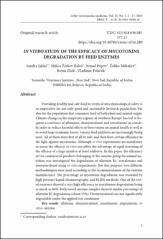| dc.contributor.author | Jakšić, Sandra | |
| dc.contributor.author | Živkov-Baloš, Milica | |
| dc.contributor.author | Popov, Nenad | |
| dc.contributor.author | Mihaljev, Željko | |
| dc.contributor.author | Zloh, Bojan | |
| dc.contributor.author | Polaček, Vladimir | |
| dc.date.accessioned | 2022-09-22T05:56:10Z | |
| dc.date.available | 2022-09-22T05:56:10Z | |
| dc.date.issued | 2022 | |
| dc.identifier.issn | 1820-9955 | |
| dc.identifier.uri | https://repo.niv.ns.ac.rs/xmlui/handle/123456789/549 | |
| dc.description.abstract | Providing healthy and safe food in terms of mycotoxicological safety is
an imperative for not only good and sustainable livestock production, but
also for the population that consumes food of both plant and animal origin.
Climate change in the temperate regions of southern Europe has led to frequent
occurrence of afl atoxins, deoxynivalenol and zearalenone in cereals.
In order to reduce harmful eff ects of these toxins on animal health as well as
to avoid large economic losses, various feed additives are increasingly being
used. All of them must fi rst of all be safe, and then have certain effi ciency in
the fi ght against mycotoxins. Although in vivo experiments are mandatory
to assess the effi cacy, in vitro test off ers the advantage of rapid screening of
the effi cacy of a large number of food additives. In this paper, the effi ciency
of two commercial products belonging to the enzyme group for animal nutrition
was investigated for degradation of afl atoxin B1, zearalenone and
deoxynivalenol using in vitro experiments. For this purpose, two diff erent
methodologies were used according to the recommendation of the enzyme
manufacturer. Th e percentage of mycotoxin degradation was recorded by
high pressure liquid chromatography and ELISA methods. One of the tested
enzymes showed a very high effi ciency in zearalenone degradation being
as much as 96%. Both tested enzyme samples showed similar percentage of
afl atoxin B1 degradation (about 35%). Deoxynivalenol was not signifi cantly
degradable under the applied test conditions. | en_US |
| dc.description.sponsorship | Th is paper is published as part of the project fi nanced by the Inovation
Fund of the Republic of Serbia. | en_US |
| dc.language.iso | en | en_US |
| dc.publisher | Scientific Veterinary Institute „Novi Sad“, Novi Sad, Serbia | en_US |
| dc.source | Arhiv veterinarske medicine / Archives of veterinary medicine | sr |
| dc.subject | afl atoxin | en_US |
| dc.subject | deoxynivalenol | en_US |
| dc.subject | zearalenone | en_US |
| dc.subject | degradation | en_US |
| dc.subject | in vitro | en_US |
| dc.subject | enzyme | en_US |
| dc.title | In vitro study of the efficacy of mycotoxins degradation by feed enzymes | en_US |
| dc.title.alternative | n vitro ispitivanje efikasnosti razgradnje mikotoksina pomoću enzima za ishranu životinja | en_US |
| dc.type | Article | en_US |
| dc.identifier.doi | 10.46784/eavm.v15i1.280 | |

